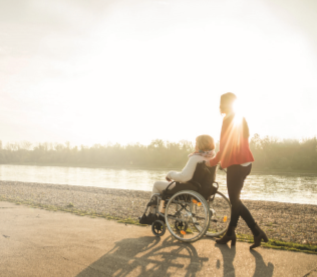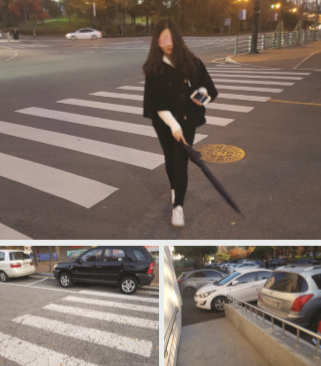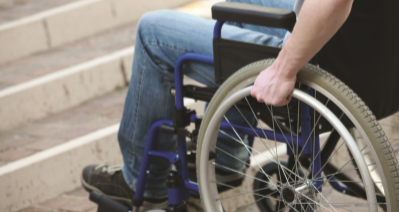/Social Scope/
Progress Begins with Consciousness

Park Yang-geon, Kim Min-jin Reporters
Everyone has the right to receive a proper education and to have access to educational facilities, without facing any discrimination. Most especially, educational institutions should be open to everyone. These days, many schools around Korea are trying to become more compliant to laws regarding accessibility for persons with disabilities. In 2017, JBNU was selected as an excellent university under the 2017 Evaluation of Educational Welfare for Disabled College Students. Then, is JBNU perfectly good for students with disabilities? As JBNU Globe reporters, the authors of this article decided to investigate the reality for students with disabilities. They trekked all over the JBNU campus to discover what assistance students with disabilities may receive to help with their rights to an education.
Laws about People with disabilities.
Under the Korean Constitution, Article 8, the ACT ON THE WELFARE OF PERSONS WITH DISABILITIES, it states: “No one shall be discriminated against in any way, shape, or form of political, economic, social or cultural life on the grounds of his or her disability.”
Similarly, Article 9 of the Constitution states that: “State and local governments shall actively promote welfare policies relative to persons with disabilities to these individuals and their guardians, and devise national policies to help other members of society understand the legal rights of persons with disabilities, according to the Korean Law.”
In addition, Article 20 requires that all educational institutions shall maintain facilities providing appropriate accessibility for persons with varying degrees of disabilities, so that they can move around the school campus without hindrance.
Lastly, under Article 4 of the ACT ON THE GUARANTEE OF PROMOTION OF CONVENIENCE FOR PERSONS WITH DISABILITIES, THE AGED, AND PREGNANT WOMEN, these persons shall be given the right to use facilities and equipment on equal terms as persons without disabilities, having free access to information, in order to guarantee them the right to pursue humane dignity, a feeling of worth, and happiness.
According to the above laws, all public buildings should be equipped with parking spaces for wheelchair bound individuals,
wheelchair accessible ramps and building entrances and exits, and elevators to all floors. In the event of any violations of this Act, the appropriate authorities may take corrective action or punishment, such as ordering facility owners to make the necessary adjustments to be in compliance with the law regarding the above-mentioned Acts for persons with disabilities. Any facility owners, who are served a correction order and thus fail to comply within the stipulated amount of time, will be fined up to 30 million Won.
However, there's a problem with law enforcement. For example, Braille guide blocks are mandatory, but there are no specific criteria. And even if one is installed, it's not continuously managed. In July 2019, the Jeonbuk Domin Ilbo newspaper pointed out, that the audible street signals installed around Jeonju were inadequate in function. Furthermore, an inspection of Gyeonggi-do conducted in July 2019, exposed facilities where toilets for persons with disabilities were converted into warehouses and where removed disabled parking lots. Additionally, earlier last year, in January 2019, it was discovered that the owner of the building in Gangnam-gu, Seoul, installed facilities for persons with disabilities in order to obtain approval for the use of the building, then removed the facilities after obtaining approval.
So what about JBNU? JBNU Globe reporters were able to learn first-hand what a student with disabilities faces and experiences on the JBNU campus.
Interview with Student with Disabilities
Hello, I’m a student with disabilities studying at JBNU. I receive help from the Disability Support Center, such as: an amanuensis and a laptop computer. So, I am satisfied with the help services that the school provides. However, I am suffering from fulfilling the requirements needed to graduate from my department, which do not consider the needs and limitations of students with disabilities. My department requires a TOEIC score of 700 or more. However, as I am hearing impaired, I am unable to take the listening portion of the TOEIC test. Another challenge I face, is completing the required English class. I can substitute the required TOEIC score by taking the English class. Unfortunately, the English class is not a formal university class, so I am unable to get the help from the center for persons with disabilities, which provides me the amanuensis in my other classes. I believe that graduation conditions, which clearly do not consider the concessions needed for students with disabilities, should be deleted or modified, and more practical policies regarding students facing a similar situation as me, are needed. I wish there were a place where students with disabilities could gather together on a regular basis. Because of the small number of students with disabilities at JBNU, it is difficult to have a regular meeting. I hope that JBNU will invest in developing more assistance and considerations for students with disabilities, so we have a chance to meet on a regular basis, as a group making up part of the JBNU student body.
How do JBNU’s facilities measure up to national standards? JBNU Globe reporters checked out JBNU’s facilities such as roads, crosswalks and street conditions.
Reporters’ Notes

First, it was observed that, there were no elevators in the College of Commerce building #2; the College of Engineering building #’s 3 and 7, College of Art building #2 had no entrance ramps. The College of Engineering building #2 had a wheelchair ramp, but it was blocked by a parked car, so was essentially inaccessible to students with disabilities. Also, most buildings, including the three colleges of Social Sciences, Education and Humanities had no ramps at the rear or side entrances, only at the front or the main door. This means, wheelchair users essentially have limited access routes into these buildings. Additionally, the Braille guide blocks were not installed in the entrances that many people use such as side doors but were usually installed at the closed central doors. Also, there were many places where Braille guide blocks were not installed in front of the crosswalk or had been left broken. Although, some crosswalks led into parking lots, cars were often parked there, blocking access. Many of the buildings, including the College of Humanities building #1 and the College of Engineering building #2, did not have toilets for persons with disabilities. Also, as was described for the picture above, all around campus, people parked their cars on crosswalks. This makes it extremely dangerous for persons with disabilities, especially those in wheelchairs, who have an obstructed view as they approach the road and passing cars and buses. It is a danger to drivers as well, who are not aware of the need for persons with disabilities to cross the road.
Moreover, we wanted to share some of the hardships of blind students, so one of the Globe reporters for this story had their eyes covered eyes and walked through JBNU relying on a stick.
Kim Min-jin(Reporter): When I walked blindfolded on the crosswalk, it took me more than four times longer than when I could see. Because there was no traffic light and crossing signal at the crosswalk, I felt scared; I didn’t know when to stop mid-step (not being able to see approaching cars). I found that I needed a wide path to check for obstacles in front of me, and I bumped into various obstacles rather frequently. I also realized that some roads had no curbside, so there were times when I was on uneven ground, making it more difficult to navigate my way, blind.
The JBNU Facilities Management Division said they are doing their best to improve conditions for persons with disabilities on campus, with plans to set up special facilities pending receipt of the related budget from the government. As we saw from the interview and reporter’s note, not only the facilities, but also the support services require a lot of improvement and "substantial" consideration for students with disabilities. An increase in public awareness is also needed.

Below is some contact information, that may help students with disabilities on campus.
The Center for Students with Disabilities: Located on the first floor at Jinsudang Room# 151 /063-270-3004
This center provides information about learning support for students with disabilities; providing services to identify an individual's disability, and offering customized aids for each need. They also provide counseling, (amanuenses) helpers, and learning materials for students with disabilities. It is possible to inquire about any inconvenience or violations found on the JBNU campus.
JBNU Facilities Management Division / 063-270-5445 or 063-270-2133 (Usually regarding facilities for persons with disabilities): https://sisul.jbnu.ac.kr/baro.php
Any repairs or inquiries regarding facilities for persons with disabilities may be handled here. If you report any inconvenience or broken facilities through the JBNU Facilities Management Division‘s internet site, they will handle it quickly. You can also report any inconvenience by completing the form at the Facility Management Office.
Persons with disabilities should enjoy, and be afforded, human rights just as anyone else. Simply instituting laws to support their needs and rights, does not solve the problems of facilities, access and academic support needed by these students with disabilities. We need serious and strong government enforcement of a practical system. A small inconvenience could present a greater and more dangerous situation for individuals with disabilities. Our society will become more advanced when we create a more conducive environment for persons with disabilities to get around freely and make requests for their needs.

